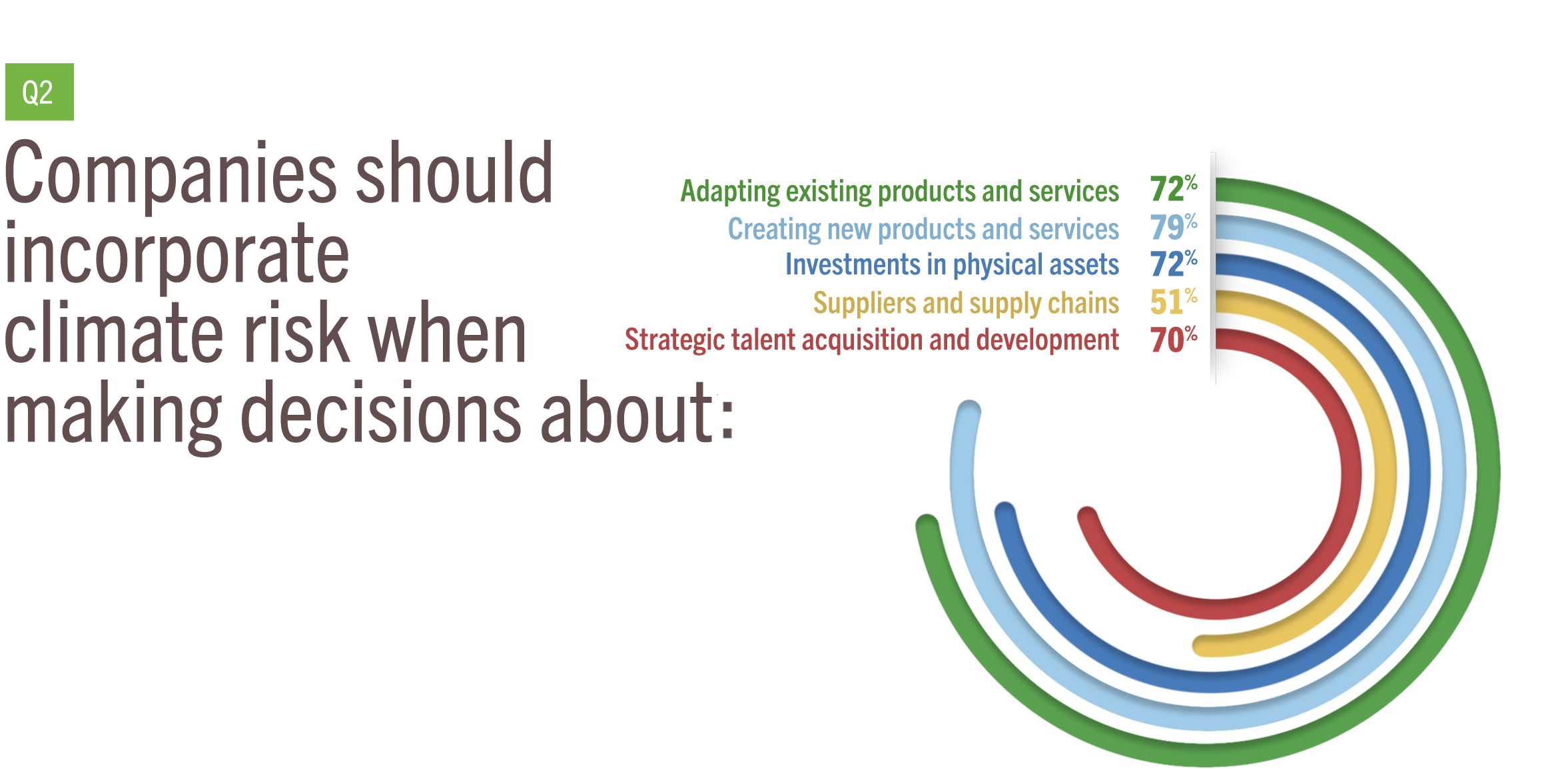Survey Results

A decisive 93 percent of Global Network faculty members think climate change poses a material risk to business across sectors.
“Climate change, possibly with air pollution, will be one of the most serious business issues, at least in Korea and China, within the next few years.”
—Namgyoo Kenny Park, Associate Dean, Seoul National University Graduate School of Business, South Korea“Climate change was once the concern of climate scientists, activists, and lobbyists. Now, it's integrated into every field of work. Climate and health, agriculture, energy, urban planning, policy making—it's cross-cutting. To lead a successful business, you have to be aware of global shifts and risks—and you have to be a leader in shaping rather than surviving hot trends (pun intended!).”
—Teresa Chahine, Sheila and Ron '92 BA Marcelo Lecturer in Social Entrepreneurship, Yale School of Management, United States

The faculty experts expressed strong positive support for companies incorporating climate risk when making decisions about investments, innovation, relationships, and talent acquisition. More than 70 percent of the experts say that companies should incorporate climate change into business decisions; there is significant concern about the sustainability of physical operations and supply chains.
“We need green human resource management practices.”
—Lynda Jiwen Song, Associate Professor and Department Head, Renmin University School of Business, China
“Change will be through greener supply chains, redesigned products that fetch incremental revenues, and services that backstop carbon emissions.”
—A. Damodaran, Professor, Indian Institute of Management Bangalore, India

Sixty-nine percent of the respondents consider a global carbon tax the most effective tool to influence business decision-making on climate risk, though only 19% said they "strongly agree." When combined with the other survey results, these numbers suggest that regulation is not the complete picture when it comes to climate-change mitigation as it affects global business.
“A carbon tax is one of the instruments that can be used, but other instruments such as tradable permits should be analyzed in courses. Also command-and-control instruments, with their advantages and disadvantages.”
—José Miguel Sánchez, Dean, Pontificia Universidad Católica de Chile School of Business, Chile

Still, experts are optimistic that a worldwide carbon tax is indeed achievable, with most respondents estimating such a tax is likely by 2030. Close to zero respondents think that a carbon tax will never happen.
“A carbon tax would be the best approach, but won't be implemented on a global basis. A more immediate issue is whether China, the United States, and others will ‘leave their country's coal in the ground.’”
—Edward A. Snyder, Indra K. Nooyi Dean and William S. Beinecke Professor of Economics and Management, Yale School of Management, United States

The majority of Global Network faculty believe a carbon-neutral economy is achievable by 2050. Close to zero respondents think that a carbon-neutral economy will never happen.
“Underdeveloped and developing countries should receive compensations for carbon reduction from developed countries who took advantage of growth without consideration of climate impact.”
—Andrés Ibáñez, Professor of Marketing, Pontificia Universidad Católica de Chile School of Business, Chile

86 percent of the experts surveyed agree that businesses cannot depend on governmental action to slow climate change.
“In an ideal world, our governments, under an organized global umbrella such as the U.N., will come up with practical systems to control and curb greenhouse gas emissions. While we wait for that desired date, when all governments act together, it is up to individuals and businesses to come up with a solution and avoid the point of no return. Schools around the world have a fiduciary responsibility to help with raising awareness and teaching future managers to care and take more action than our and previous generations did.”
—Majid Ghorbani, Renmin University School of Business, China
“Climate change represents such an incredible opportunity to leverage the power of business to create a sustainable future. To achieve this, we must collectively reframe the narrative of business about purpose first and where profits are a byproduct.”
—Robert Strand, Executive Director, Center for Responsible Business at Haas School of Business, University of California Berkeley, United States

Overwhelmingly, professors at top business schools agree that climate change and its impact on business and society should be incorporated into the core MBA curriculum. Interestingly, the survey responses on how to achieve this span a wide spectrum—from emphasizing the risks of climate change to discussing its opportunities, indicating that business students should learn a balance of climate-driven risks and rewards for businesses.
“It is imperative that business schools seriously assess the business impact of climate change, and develop solutions. The topic must be a core consideration and not relegated to an elective.”
—Audrey Chia, Associate Professor, National University of Singapore Business School, Singapore
“Cases about climate risks and opportunities (innovations) should become part of the core curriculum in every kind of course.”
—William Rosenzweig, Director, Sustainable Food Initiative, Center for Responsible Business, Haas School of Business, University of California Berkeley, United States“A related topic to study is catastrophic risk.”
—Raicho Bojilov, Assistant Professor, Pontificia Universidad Católica de Chile School of Business Chile, Chile
Methodology
The survey was conducted from December 12 through 23, 2018, and included all 30 Global Network schools.
Member Schools
-
Asian Institute of Management Philippines
-
ESMT Berlin Germany
-
HEC Paris France
-
Hong Kong University of Science and Technology Business School Hong Kong SAR China
-
IE Business School Spain
-
IMD Switzerland
-
INCAE Business School Costa Rica
-
Saïd Business School, University of Oxford United Kingdom
-
Seoul National University Business School South Korea
-
University of Cape Town Graduate School of Business South Africa
-
UNSW Business School Australia
-
Yale School of Management United States
